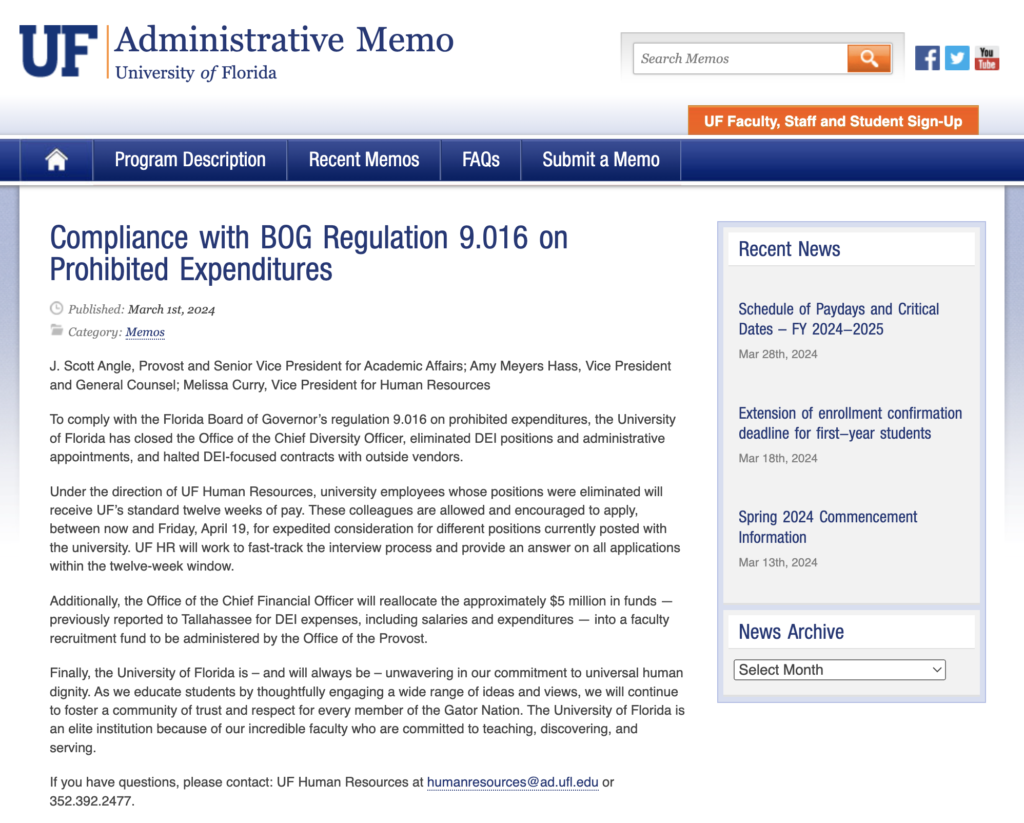
Photo Courtesy: Forbes.com
Florida’s public universities are now navigating the aftermath of Senate Bill 266, a bill approved in 2023 at the urging of Governor Ron DeSantis. It prohibits all funding for diversity, equity and inclusion (DEI) programs — and the repercussions are becoming palpable.
As each university administration finds itself at a crossroads about how to comply with the law, and the effects of the law become real, one can’t help but ask: What now?
The University of Florida took a direct approach to the law, sending a public memorandum announcing the closing of the Office of Chief Diversity Officers, removing specific administrative DEI positions, and canceling all DEI focused contracts.
UF officials have chosen to allow the Office of the Provost to decide where they will reallocate the nearly $5 million that had been earmarked for DEI program. The university also chose to end the memo saying they are committed to human dignity.
“Finally, the University of Florida is — and will always be — unwavering in our commitment to universal human dignity,” the memo reads. “As we educate students by thoughtfully engaging a wide range of ideas and views, we will continue to foster a community of trust and respect for every member of the Gator Nation.”

Photo Courtesy: University of Florida
ln Tallahassee, FAMU, FSU and TCC have each been responsible for submitting data on the programs that promote critical race theory (CRT) or DEI. The interpretation of the definition for both was in the hands of the university.
TCC reported no programs, FSU reported 34 CRT courses and 27 DEI programs, and FAMU reported 15 DEI programs. Both FSU and FAMU, however, have chosen low-key moves and quietly stripped their DEI programs.
If someone were to search for any DEI programs on FAMU’s website they will be met with either a “Not Found” page and a brief apology note, or taken to a web address that displays “404 – File or directory not found,” in glaring red letters.

Photo Courtesy: FAMU’s Diversity and Inclusion Directory
In an article on diverseeducation.com, Jeffrey Q. McCune Jr., chair of Black studies at the University of Rochester, details why the cutting of these programs can have a potential negative effect on Florida’s college campuses.
“Part of what we are seeing is an elimination of offices that help retain faculty that have historically not been included in the university culture,” McCune said. “Opportunities that are being eliminated are opportunities for students for whom the culture has not been able to be inclusive and inviting.”
What’s the cost of losing DEI on FAMU’s campus?
Before the law took effect, FAMU previously allocated $4.4 million to the 15 programs that were identified. Among those programs was the Environmental Equity and Justice program, the Institute of Public Health, the Meek-Eaton Southeastern Regional Black Archives Research Center and Museum, and the Center for Disability Access and Resources (CeDAR).
The Environmental Equity and Justice program received the most money, nearly $1.8 million, and the Institute of Public Health received about $1.5 million. The Black Archives received around $350,000 and CeDAR received the least at approximately $320,000.
FAMU President Larry Robinson, while clearly acknowledging the law by submitting a report that 15 DEI programs be cut, provides a testimony that FAMU has not and will not change in the face of adversity.
“FAMU hasn’t changed and everyone who crosses the threshold will be welcome as they have for the past 136 years,” Robinson said. “We’re going to offer them the best education we can, and we will continue the great work we do here.”
Although Robinson’s conviction that FAMU will continue to provide a comprehensive education, the decision to quietly dismantle DEI programs to comply with the law underscores his sentiment, especially considering there was an option to not submit anything at all, as seen with TCC.
While FAMU tried to mitigate the effects by choosing to quietly eliminate funding for 15 programs, paling in comparison to FSU’s 57 program cuts or UF’s public memo, the loss of funding to these vital programs is bound to have adverse, long-term effects, and the future of diversity and inclusion can no longer be guaranteed for future generations of FAMU students.